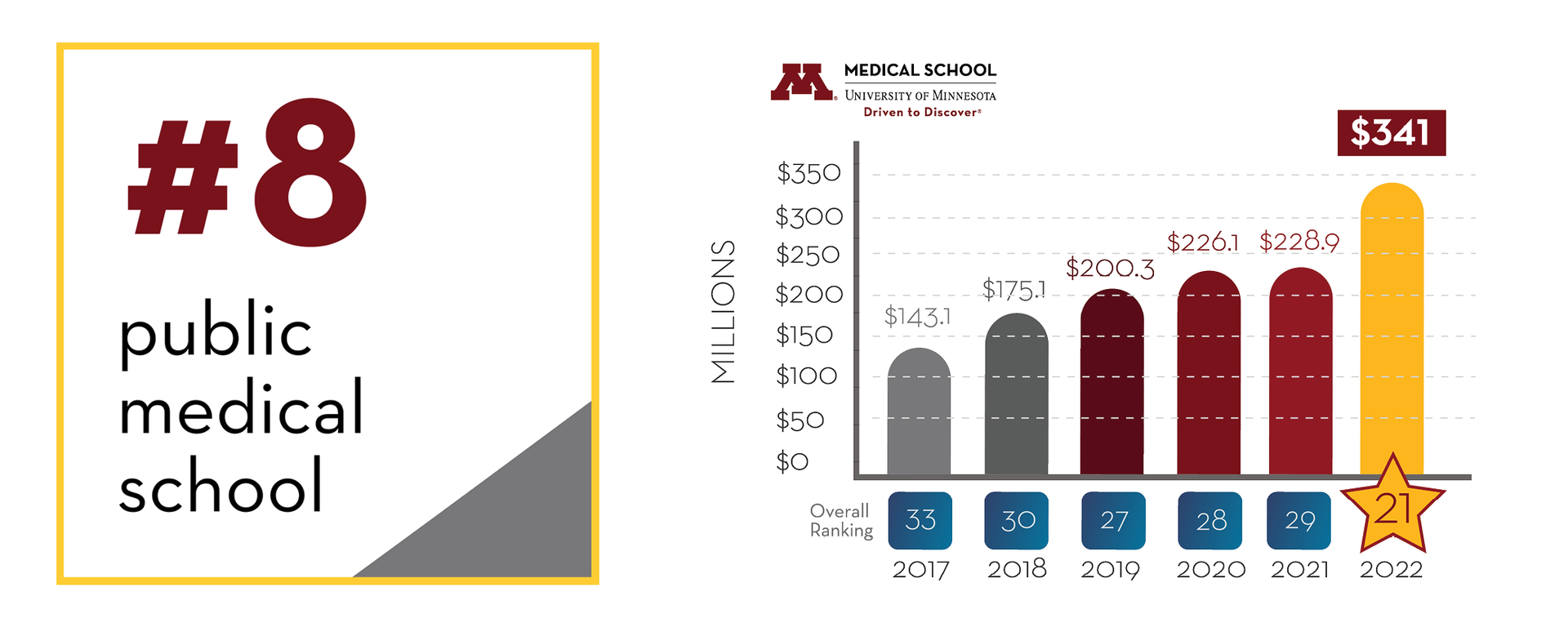Prospective Trainees

A message from the Associate Director of the GPS Office
Prospective trainees, Thank you for visiting our webpage. Here you will find resources and information that will help you in deciding on whether the Univ of Minnesota Medical School graduate programs or postdoctoral scholar research offerings is ideal for the next stage of your training in the biomedical sciences. Importantly, I and my office staff are available to answer any questions you may have. Please e-mail us at gps-office@umn.edu.
Prospective Graduate Students
Graduate programs in the Medical School are specialized units that provide an exceptional quality of training in diverse disciplines of biomedical sciences. We offer 11 graduate programs to allow for focused studies in diverse areas of Microbiology, Immunology, Cancer, Pharmacology, Biochemistry, Molecular Biology, Biophysics, Rehabilitation Sciences, Molecular and Cellular Biology, Genetics, Neuroscience, Stem Cell Biology, Medical Physics, Integrative Biology and Physiology and Integrated Biosciences.
Most of our programs offer predoctoral/PhD training, with some offering Master's degree graduate training. In addition, the Medical School offers joint MD-PhD degrees through the Medical Scientist Training Program. Typical deadlines for our doctoral programs fall in late November/early December for enrollment in the Fall semester.
This includes a commitment to provide the total stipend, tuition, and fees for all Biomedical Sciences Graduate Program incoming students for their first year. In addition, the Medical School demonstrates a commitment to providing dedicated space for all of our program's educational, student and administrative activities, and a yearly budget that demonstrates the College's commitment to diversity recruitment and retention, as well as to career development.
Prospective Postdoctoral Scholars
A postdoctoral scholar at the University of Minnesota is an individual who has received a doctoral degree (or equivalent) and is in a temporary and defined period of mentored advanced training to enhance their professional and research skills. The Medical School typically supports 5 years of mentored training with individuals selected into the positions within 10 years of their doctoral degree (i.e. MD, PhD, DVM or doctoral-equivalent). Postdocs are further classified under two types of scholar appointments: Postdoctoral Associate or Postdoctoral Fellow.
The Medical School has numerous opportunities for postdoctoral training across a range of Centers, Institutes and Programs (CIPs). As a premier research enterprise, the University of Minnesota provides outstanding training in numerous inter- and multidisciplinary areas of basic, translational and clinical biomedical science and health-related research.
Please see the GPS Office webpages on Postdoctoral Scholars for more information on both finding positions and training in the Medical School.
The Postdoctoral Handbook is a guide for incoming and existing Postdocs to help navigate their time in the Medical School at the University of Minnesota.

Graduate Programs in the Medical School
- Molecular Pharmacology and Therapeutics
- Microbiology, Immunology and Cancer Biology
- Rehabilitation Sciences
- Molecular, Cellular, Developmental Biology and Genetics
- Biochemistry, Molecular Biology and Biophysics
The Molecular Pharmacology and Therapeutics (MPaT) Master's Program and PhD Program have approximately 50 faculty members and 50 graduate students engaged in basic and translational research on the ways cellular biology is affected by drugs and other chemicals
The Microbiology, Immunology, and Cancer Biology (MICaB) Graduate Program offers a highly collaborative environment, with faculty who are committed to fostering students’ growth as a scientist.
Rehabilitation science focuses on research related to human function and minimizing the impact of disabilities. The Graduate Program in Rehabilitation Science aims to provide a high-quality educational experience to train future rehabilitation scientists. Students receive a strong foundation in research methodology and a working knowledge of the importance of a collaborative approach to the scientific process.
The Molecular, Cellular & Developmental Biology & Genetic Graduate Program emphasizes basic research in the fields of genetics, cell biology and development through the use of model organisms.
The Biochemistry, Molecular Biology, and Biophysics Graduate Program focus on determining the molecular mechanisms that underlie biological function.
- Neuroscience
- Integrative Biology and Physiology
- Medical Physics
- Stem Cell Biology
- Biomedical Sciences MS Program
The Graduate Program in Neuroscience is a large, multidisciplinary program consisting of 100-plus faculty members from more than 25 departments and nine colleges.
The Graduate Program in Integrative Biology & Physiology (IBP) is a unique hybrid of the field of physiology, the cornerstone of biomedical research and medicine, and the fields of molecular, genetic, and cellular biology.
The Medical Physics Graduate Program prepares students for further education, teaching, and research in medical physics; to qualify to enter a medical physics residency program in radiation oncology or diagnostic radiology; and to further their education through advanced degrees, clinical training, or personally motivated continuing education.
The Master of Science Degree in Stem Cell Biology offers training in stem cell biology, a rapidly growing interdisciplinary field that rests on foundations provided by molecular, cellular, and developmental biology. Students take lecture, lab, and seminar classes in these various disciplines, in addition to stem cell biology. They interact with members of the Stem Cell Institute through participation in research seminars and journal clubs and spend a full calendar year conducting stem cell research in the laboratory of a faculty member.
The NEW Gateways to Medicine and Research Master’s Program is a recently approved umbrella program that will host its inaugural class in the fall of 2023. The Gateways MS Program is intended to provide training for students interested in boosting their application to medical school or preparing for careers in biomedical research. The program consists of two tracks: a 1-year Medical Track (non-thesis, Plan B MS) and a 2-year Research Track with thesis (Plan A MS).
Centers, Institutes and Programs for Prospective Postdoctoral Scholars
- Center for Immunology (CFI)
- Institute for Translational Neuroscience
- Center for Magnetic Resonance Research, Department of Radiology
- Developmental Biology Center
- Institute for Diabetes, Obesity and Metabolism
- Institute for Engineering in Medicine
The Center for Immunology is an interdisciplinary research program at the University of Minnesota devoted to advancing the field of immunology and educating future immunologists. | Autoimmunity • Cancer • Vaccines • Cures
The Institute for Translational Neuroscience's greatest strength is bringing together different groups under one common goal: to advance neuroscience research at the University of Minnesota. The Institute for Translational Neuroscience (ITN) was established in 2007 as a University-wide presidential initiative to promote the transfer of discoveries in the basic neurosciences to clinical practice. The institute is charged to enhance basic science discovery with new knowledge leading to subsequent clinical trials and establishment of new therapeutic principles or tools.
Our main goal is to attract and recruit top scientists to shape discoveries that will lead to tomorrow's cures. The institute exemplifies how different disciplines, departments, and centers can work together in partnership to evolve neurological disease research at the University of Minnesota. We have built a community that encourages learning, education, innovation, and discovery all of which are more successful in a team-oriented environment.
Center for Magnetic Resonance Research (CMRR), funded as a Biotechnology Research Center (BTRC) by the National Center for Research Resources (NCRR) until 2012 and by the National Institute of Biomedical Imaging and Bioengineering (NIBIB) since then, focuses on development of unique magnetic resonance (MR) imaging and spectroscopy methodologies and instrumentation for the acquisition of structural, functional, and biochemical information non-invasively in humans, and utilizing this capability to investigate organ function in health and disease.
The Developmental Biology Center (DBC) is a group of some 50 faculty who share an interest in the processes that create the form and function of the biological world around us. At the heart of developmental biology lies a search for the mechanisms that specify cell fates, control patterning in complex tissues, and organize collections of diverse cells into organs. Deciphering these mechanisms requires many approaches, including cell biology, genetics, molecular biology, biochemistry, and neurobiology. These areas are reflected in the interests and research efforts of our faculty.
The mission of the Institute for Diabetes, Obesity and Metabolism (IDOM) is to enhance research quality by growing multidisciplinary collaborations in diabetes research by creating a rich environment that unites diabetes investigators through enrichment and training opportunities, to provide access to pilot funds, and to make cost-effective animal physiology services available to members of the IDOM. Our goal is to create the environment and infrastructure necessary to support funded diabetes investigators and the integration of their data into our greater understanding of the whole of diabetes.
The Institute for Engineering in Medicine's (IEM) mission is to advance healthcare through research partnerships between faculty in the health sciences, faculty in the College of Science and Engineering, and the biomedical industry. The Institute for Engineering in Medicine (IEM) research collaborations aim at the development of innovative engineering solutions for diagnosis, treatment, and prevention of disease. We are always looking to add new research themes as we add new members and research partners to IEM.
- Lillehei Heart Institute
- Stem Cell Institute
- University of Minnesota Institute on Infectious Diseases
- Paul and Sheila Wellstone Muscular Dystrophy Center
The Lillehei Heart Institute was built twenty years ago on the legacy of University of Minnesota icons who created a culture of innovation and discovery. Today, established investigators work together with the next generation of young investigators to advance scientific discovery in the development of cardiovascular disease therapies and to provide training and education for our future cardiovascular scientists and physicians.
The Stem Cell Institute’s vision is to use stem cell biology to change the practice of medicine through discovery, education, and translation. For twenty years, the Stem Cell Institute has brought together talent and expertise from across the University of Minnesota to use stem cell biology to advance regenerative medicine therapies for devastating disorders and to provide education and training for the stem cell scientists of tomorrow.
The University of Minnesota Institute on Infectious Diseases (UMIID) brings together University of Minnesota expertise across disciplines to discover better responses to pandemics, life-threatening infections and antimicrobial resistance through basic, translational, and clinical research. The University of Minnesota Institute on Infectious Diseases (UMIID) was established in 2022 at the University of Minnesota Medical School as the intersection for all areas of infectious disease research at the University.
Goals for the institute are: Research diseases of pandemic and epidemic potential through collaboration among the University’s basic, clinical, and translational experts, Provide training opportunities for physician scientists, Partner with industry for scientific collaboration and Translate scientific outcomes to the people of Minnesota
The Paul and Sheila Wellstone Muscular Dystrophy Center (MD Center) at the University of Minnesota Medical School is a multi-disciplinary scientific, translational, and clinical hub of research, education, and clinical care related to a wide range of muscular dystrophies and other neuromuscular disorders.
Mission
To help families, clinicians, and scientists speak a common language as they strive towards their shared goal of optimizing research, education, and clinical care for muscular dystrophy and other neuromuscular disorders.
Vision
To be a leader in the development of novel molecular diagnostic and therapeutic approaches for muscular dystrophy and other neuromuscular disorders, and to be an internationally renowned educational and training site for a range of scientists and clinicians who wish to study and treat these disorders.